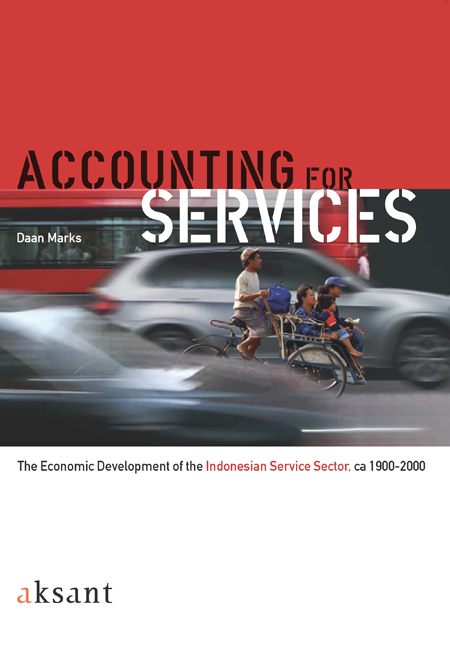Book contents
- Frontmatter
- Contents
- List of Tabels
- Acknowledgement
- 1 Introduction
- 2 National Accounting for Services in Indonesia
- 3 The Development of the Indonesian Service Sector: A Quantitative Analysis
- 4 Roads to Riches? Transportation and Economic Development in Indonesia
- 5 Involution and Growth: the Ambiguous Role of the Trade Sector in the Economic Development of Indonesia
- 6 Unity or Diversity?: Market Integration through Trade and Transport
- 7 Conclusions
- Appendices
- References
3 - The Development of the Indonesian Service Sector: A Quantitative Analysis
- Frontmatter
- Contents
- List of Tabels
- Acknowledgement
- 1 Introduction
- 2 National Accounting for Services in Indonesia
- 3 The Development of the Indonesian Service Sector: A Quantitative Analysis
- 4 Roads to Riches? Transportation and Economic Development in Indonesia
- 5 Involution and Growth: the Ambiguous Role of the Trade Sector in the Economic Development of Indonesia
- 6 Unity or Diversity?: Market Integration through Trade and Transport
- 7 Conclusions
- Appendices
- References
Summary
INTRODUCTION
Horlings (1995: 35) has argued that ‘historical national accounting is a useful tool for measuring economic growth, but cannot be more than a starting point for the analysis of economic development process’. Earlier Ole Krantz (1983: 131), a Swedish economist who worked on the Swedish historical national accounts, concluded that ‘processing national accounts data along methodologically proper lines can create new analytical purposes’. In the preceding chapter and the appendices the reconstruction of the Indonesian service sector within the framework of national accounts has been done. Now that we know how the statistics have been compiled, it is time for the analysis and searching for ‘new analytical purposes’.
The aim of this chapter is to provide a first analysis of the quantitative development of the Indonesian service sector between 1900 and 2000. The underlying question that I try to answer is whether Indonesia has transformed in what Kuznets would call a ‘modern’ economy’, i.e. sustained increase in per capita income combined with rapid population growth and sweeping structural changes (Kuznets 1966: 1). According to Kuznets this process is the result of productivity gains in all sectors of the economy and an increase in the scale of production and consumption. Therefore in this chapter I analyse to what extent ‘sweeping structural changes’ took place in both the occupational structure and the production structure. Combining these elements enables us to assess what happened to labour productivity in the different sectors.
The remainder of this chapter is organised as follows. First I discuss developments in the occupational structure. In section 3.3 changes in the economic structure are analysed. Section 3.4 examines the development of labour productivity in the service sector in a comparative perspective. Section 3.5 concludes.
DEVELOPMENTS IN EMPLOYMENT STRUCTURE
According to Kuznets (1971) an indicator of economic development is the share of agriculture in employment and output. He found that, as countries develop, the share of the labour force working in the agricultural sector falls. At first this is due to an increasing share employed in the industrial sector. In a later stage of development economic theory predicts that the share of employment in the service sector will start to rise.
Information
- Type
- Chapter
- Information
- Accounting for ServicesThe Economic Development of the Indonesian Service Sector, ca 1900–2000, pp. 71 - 90Publisher: Amsterdam University PressPrint publication year: 2009
